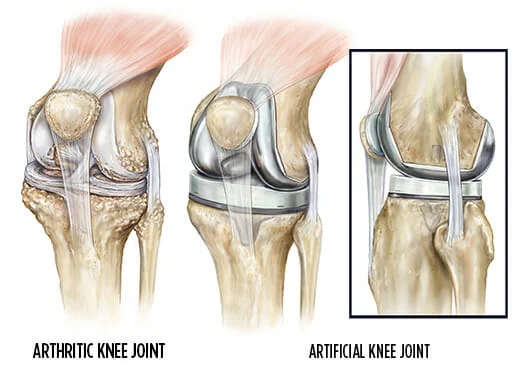Certainly! Knee replacement implants, also known as prostheses, are designed to provide pain relief and restore function to individuals suffering from severe knee arthritis or trauma. The lifespan of these implants can vary based on several factors, and understanding these factors is crucial for managing expectations and optimizing outcomes for patients.
Typical Lifespan of Knee Replacement Implants:
- General Expectations: On average, knee replacement implants are expected to last around 15–20 years. However, many patients experience much longer durability, often 20 years or more, especially with newer implant designs and materials.
- Implant Type: The type of materials used in the implants can significantly influence their lifespan. Modern implants are typically made from durable metals (like titanium or cobalt-chromium alloys) for the femoral and tibial components, and high-density polyethylene for the spacer that acts as the joint surface.
- Patient Factors: The overall health and activity level of the patient play a crucial role. Younger, more active patients may put more stress on the implants, potentially shortening their lifespan compared to older, less active individuals.
- Implant Design and Technology: Advances in implant design, such as improved fixation methods (like cemented vs. uncemented), better wear-resistant materials, and enhanced joint articulation, contribute to longer implant longevity.
- Surgeon Skill and Surgical Technique: The expertise of the surgeon performing the procedure can impact implant lifespan. Precise alignment and proper implant positioning are critical for optimal function and durability.
- Post-Operative Care: Following recommended post-operative care and rehabilitation protocols can help minimize complications and improve the longevity of the implant.
Factors Affecting Longevity:
- Activity Level: High-impact activities or excessive weight can accelerate wear and tear on the implants, potentially shortening their lifespan.
- Obesity: Excess body weight can increase stress on the implants, leading to faster wear and loosening.
- Medical Conditions: Conditions such as osteoporosis or inflammatory arthritis may affect the bone quality and implant stability over time.
- Implant Wear: Despite advancements, all implants undergo a degree of wear over time, which can lead to particle debris and potential implant loosening or failure.
- Infection: Infection around the implant can compromise its stability and lead to premature failure.
- Revision Surgery: In cases where the implant needs to be replaced (revision surgery), the longevity of subsequent implants may be shorter than the original.
In summary, while knee replacement implants typically last 15–20 years or more, their lifespan can vary based on patient factors, implant design, surgical technique, and post-operative care. Advances in materials and technology continue to improve implant longevity, offering patients greater mobility and relief from knee pain for extended periods.






Comments